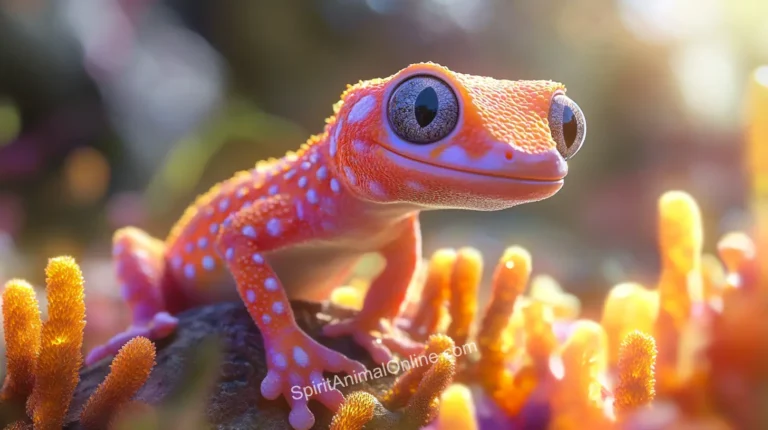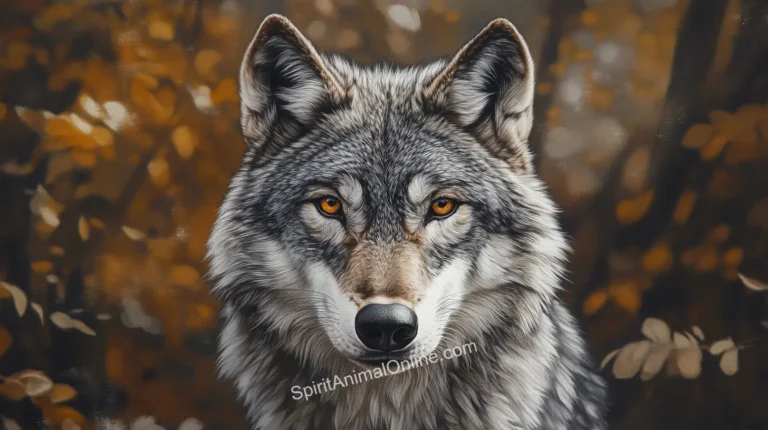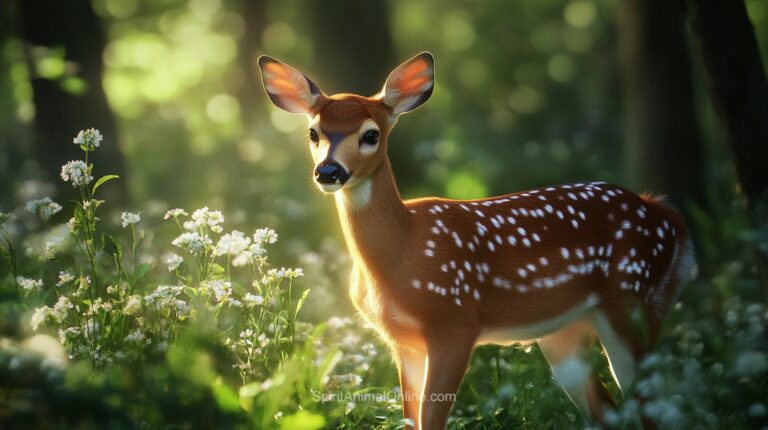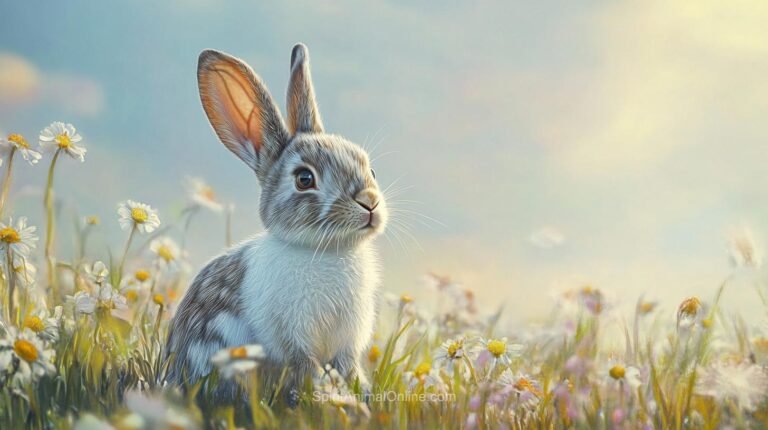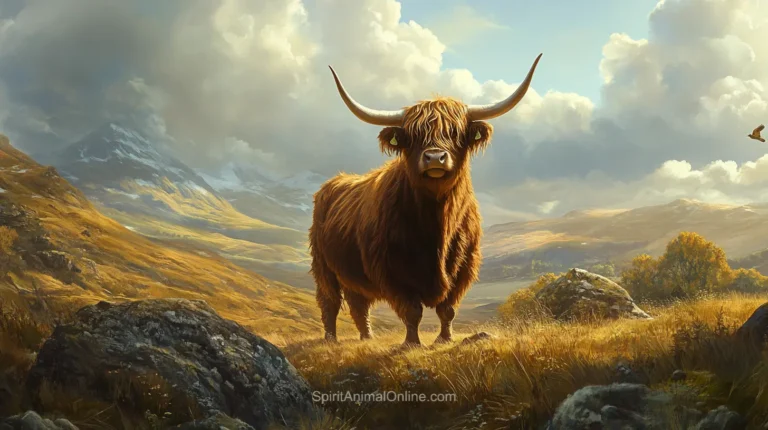Quokka Spirit Animal: The Joyful Guide to Positivity and Friendliness
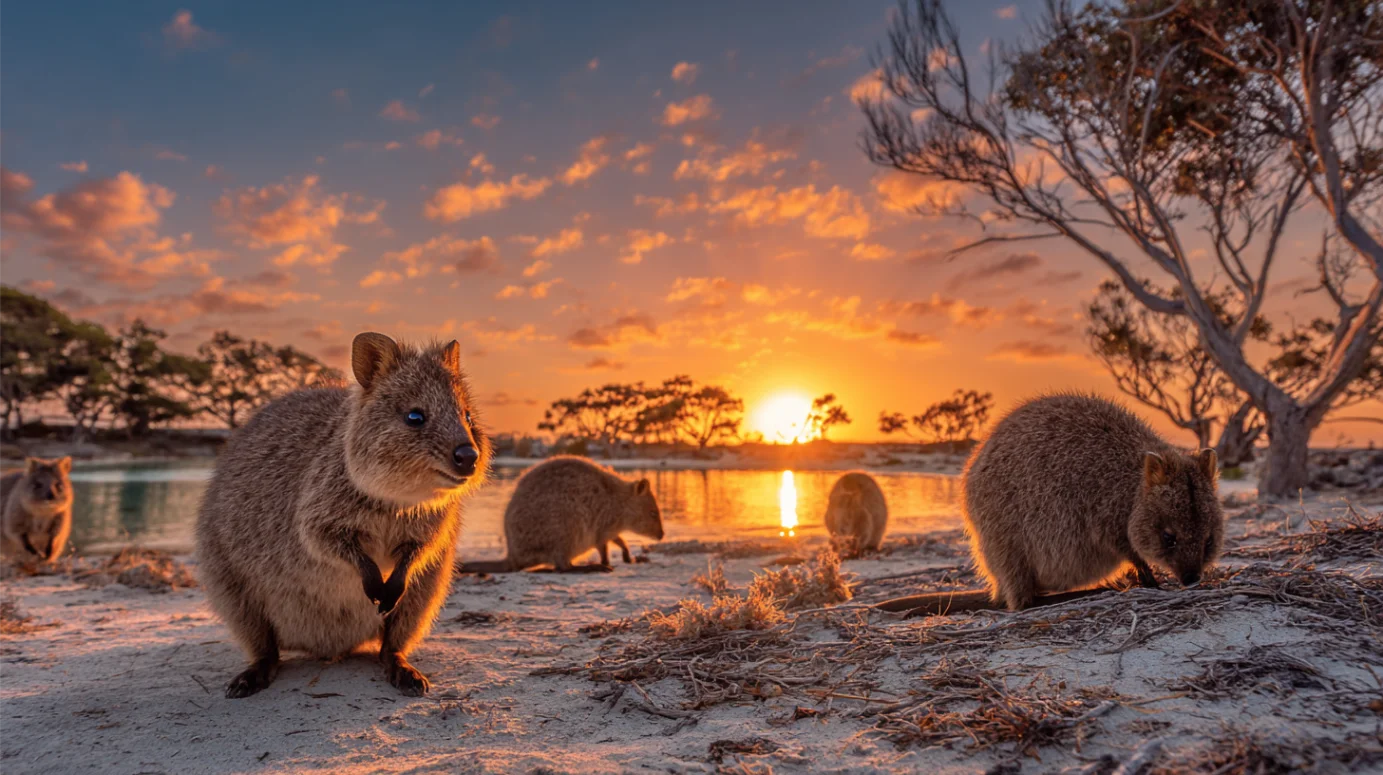
In the sun-drenched landscapes of Western Australia, a small marsupial has captured hearts worldwide with its seemingly perpetual smile and infectious joy. The quokka (Setonix brachyurus), often dubbed the “happiest animal on Earth,” stands as nature’s ambassador of positivity, teaching us profound lessons about finding contentment in simplicity and approaching life with unwavering optimism.
These cat-sized marsupials, with their rounded ears, compact bodies, and distinctive upturned mouths that create an appearance of constant happiness, have become unlikely internet sensations and spiritual guides. Native to small islands off the coast of Western Australia, particularly Rottnest Island, quokkas possess an extraordinary ability to radiate joy that transcends species barriers. Their fearless curiosity toward humans and natural photogenic qualities have made them symbols of pure, unadulterated happiness in our often-stressed modern world.
The quokka spirit animal emerges as a powerful totem for those seeking to reconnect with life’s simple pleasures and cultivate genuine friendliness. In a world where negativity often dominates headlines and social interactions, the quokka’s message is refreshingly clear: happiness is not just possible—it’s natural, accessible, and contagious.
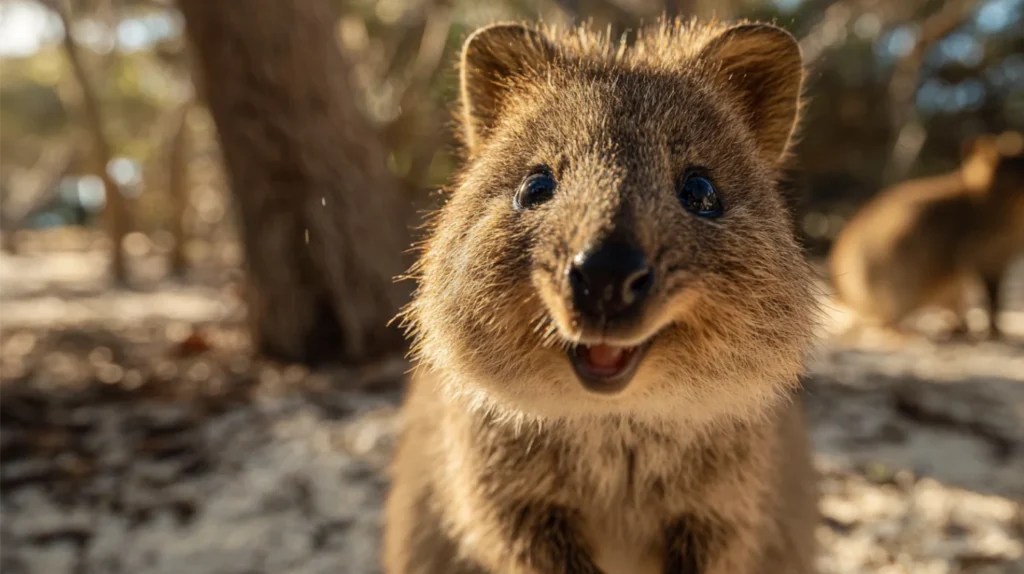
The Symbolism and Spiritual Meaning of the Quokka
Core Symbolic Meanings
The quokka spirit animal embodies several profound spiritual qualities that offer guidance for personal growth and emotional well-being:
- Joy and Contentment: The most obvious quokka symbolism centers on pure, uncomplicated happiness. Unlike human joy, which often depends on external circumstances, the quokka’s contentment appears to spring from an inner source of peace and acceptance.
- Authentic Friendliness: Quokkas demonstrate genuine openness to connection without the protective barriers that many animals (and humans) maintain. This represents the spiritual principle of approaching others with an open heart and assuming positive intent.
- Present-Moment Awareness: These marsupials live fully in the present, neither dwelling on past difficulties nor anxiously anticipating future challenges. The meaning of quokka energy teaches us to find richness in the current moment.
- Resilience Through Positivity: Despite facing environmental challenges and predation pressures, quokkas maintain their cheerful demeanor, symbolizing the power of positive attitude in overcoming adversity.
Biological Traits and Spiritual Lessons
The quokka’s natural behaviors offer remarkable insights into spiritual living:
- Social Harmony: On Rottnest Island, quokkas live in loose social groups that demonstrate cooperation without competition. They share resources peacefully and rarely display aggressive behaviors toward one another. This reflects the spiritual principle that abundance flows more freely in communities built on mutual support rather than rivalry.
- Adaptive Diet: Quokkas are herbivores capable of thriving on various plant materials, adjusting their diet based on seasonal availability. Spiritually, this represents flexibility and the ability to find nourishment in whatever life circumstances present.
- Water Conservation: These remarkable animals can survive with minimal water intake, obtaining most of their hydration from vegetation. This biological adaptation symbolizes the spiritual ability to find sustenance and renewal from unexpected sources, particularly during challenging periods.
- Nocturnal Activity: While quokkas are often photographed during daylight hours, they’re primarily active at dawn and dusk. This crepuscular nature represents the spiritual wisdom of finding balance between action and rest, engagement and reflection.
Quick Facts About Quokka Symbolism
| Spiritual Quality | Natural Behavior | Life Application |
|---|---|---|
| Unconditional Joy | Perpetual “smile” expression | Finding happiness independent of circumstances |
| Fearless Curiosity | Approaching humans without hesitation | Embracing new experiences with openness |
| Community Harmony | Peaceful coexistence in groups | Building relationships based on cooperation |
| Resourcefulness | Thriving in limited habitat | Making the most of available opportunities |
| Authenticity | Genuine, unguarded behavior | Living without pretense or defensive masks |
Cultural and Mythological References
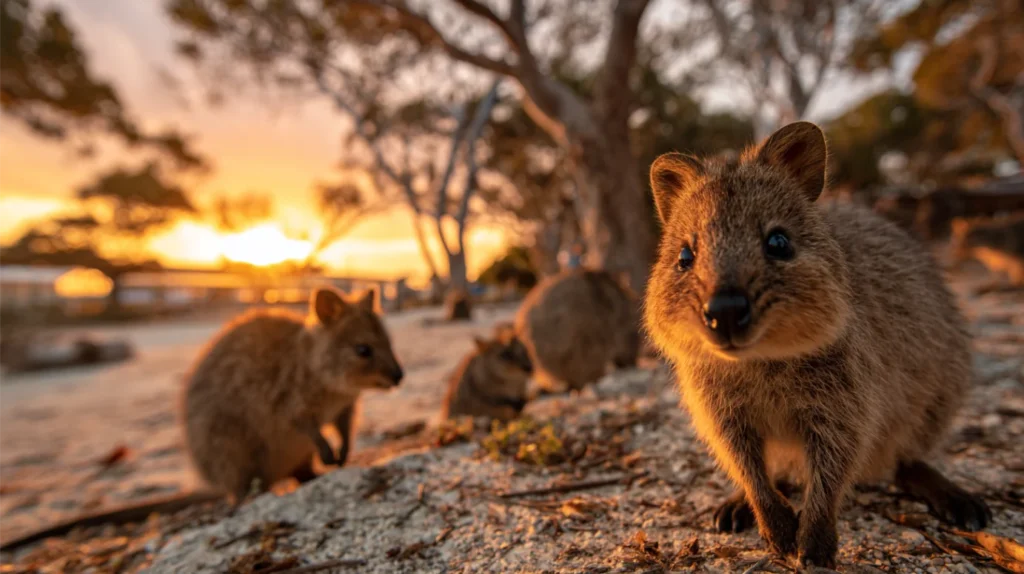
Indigenous Australian Perspectives
While specific quokka legends from the Noongar people (the traditional custodians of the land where quokkas live) are not widely documented in accessible sources, the broader Aboriginal Australian spiritual framework provides context for understanding the quokka’s significance. In Aboriginal culture, all animals are considered teachers and holders of specific wisdom, with each species offering unique lessons about living in harmony with the natural world.
The Noongar people traditionally called Rottnest Island “Wadjemup,” and their deep connection to the land included respectful relationships with all native species. In this cultural context, the quokka would be understood as a keeper of joy medicine—a living reminder that happiness is a natural state of being when one lives in proper relationship with country and community.
The Aboriginal concept of “country” encompasses not just physical landscape but the spiritual, emotional, and cultural connections between all living beings. Within this framework, the quokka spirit animal represents the importance of maintaining positive relationships and finding joy even in challenging environments.
Modern Cultural Impact and Meme Culture
The quokka’s rise to internet fame began in the early 2010s when tourists started sharing “quokka selfies” from Rottnest Island. This phenomenon transformed the quokka into a global symbol of happiness and positivity, transcending its original habitat to become a universal representation of joy.
In contemporary digital culture, quokka symbolism has evolved to represent:
- Authentic happiness in contrast to performative social media joy
- Mental health awareness and the importance of genuine emotional well-being
- Environmental consciousness as people learn about quokka conservation needs
- Mindful tourism that respects wildlife while seeking meaningful connections
The quokka’s meme status reflects humanity’s deep hunger for genuine positivity. In an era of curated online personas and manufactured happiness, the quokka’s unfiltered joy resonates as something real and attainable.
Cross-Cultural Spiritual Interpretations
Various spiritual traditions find meaning in the quokka’s characteristics:
Buddhist Perspective: The quokka embodies the Buddhist concept of mudita (sympathetic joy)—the ability to feel happiness for others’ well-being without jealousy or comparison. Their peaceful coexistence demonstrates non-attachment and contentment.
Western Shamanic Traditions: In contemporary shamanic practice, the quokka spirit animal is called upon for healing depression, social anxiety, and cynicism. It serves as a guide for those seeking to reconnect with their natural capacity for joy and trust.
Practical Lessons from the Quokka Spirit Animal
Developing Authentic Positivity
Working with quokka energy involves cultivating genuine happiness rather than forced optimism. The quokka spirit animal teaches us that true joy emerges from:
- Acceptance of Present Circumstances: Like quokkas thriving in their limited island habitat, we can find contentment within our current life situations while still working toward positive change.
- Gratitude for Simple Pleasures: Quokkas find joy in basic activities—eating, resting in shade, social interaction. Their spirit guide energy encourages us to rediscover wonder in everyday experiences.
- Emotional Authenticity: The quokka’s “smile” isn’t a mask—it reflects genuine contentment. This teaches us to honor our true feelings while choosing responses that align with our highest good.
Enhancing Social Connections
The meaning of quokka energy extends powerfully into relationship dynamics:
- Approaching Others with Openness: Quokkas greet humans and other quokkas with curiosity rather than suspicion. This models how we might approach new relationships and social situations.
- Creating Safe Spaces: The peaceful quokka communities on Rottnest Island demonstrate how groups can function without hierarchy or aggression. We can apply this by fostering inclusive, supportive environments in our families, workplaces, and communities.
- Practicing Non-Judgmental Presence: Quokkas don’t appear to categorize others as threats or allies—they simply engage with what’s present. This teaches us to meet people where they are without immediately imposing our expectations or fears.
Meditation and Visualization Practices
Quokka Joy Meditation
- Preparation: Find a comfortable seated position and close your eyes. Take several deep breaths, allowing your body to relax with each exhale.
- Visualization: Imagine yourself on a sunny Australian island, surrounded by gentle vegetation and warm ocean breezes. See a friendly quokka approaching you with curiosity and joy.
- Connection: Visualize the quokka’s natural happiness flowing into your heart center. Feel this joy as a warm, golden light expanding throughout your body.
- Integration: Ask the quokka spirit animal to show you one simple way to bring more authentic joy into your current life situation. Trust whatever image or feeling arises.
- Gratitude: Thank the quokka for its guidance and slowly return your awareness to your physical surroundings.
Daily Quokka Practices
Morning Joy Check-in: Upon waking, ask yourself: “How can I approach today with quokka-like curiosity and openness?”
Midday Smile Break: Take a moment to genuinely smile, remembering that like the quokka’s expression, your joy can be contagious and healing for others.
Evening Gratitude: Before sleep, identify three simple pleasures from your day, honoring the quokka’s ability to find contentment in basic experiences.
Journaling Prompts for Quokka Spirit Work
- What would change in my life if I approached challenges with quokka-like optimism?
- How can I create more “Rottnest Island” energy in my daily environment?
- What fears or defenses prevent me from showing up as authentically as a quokka?
- Where in my life do I need more playfulness and curiosity?
- How can I contribute to the emotional well-being of my community?
Conservation and Ethical Considerations
Protecting the Happiest Animal
While working with quokka spirit animal energy, it’s important to understand the real-world challenges facing these remarkable creatures. Quokkas are classified as vulnerable, with their population primarily concentrated on Rottnest Island and a few mainland locations in Western Australia.
Conservation Challenges:
- Habitat loss due to development and climate change
- Introduced predators like foxes and cats
- Human interference and inappropriate feeding
- Limited genetic diversity due to small population size
Supporting Quokka Conservation:
- Donate to Australian wildlife conservation organizations
- Practice responsible tourism if visiting Rottnest Island
- Spread awareness about quokka conservation needs
- Support indigenous land management practices
Respectful Spiritual Practice
When working with quokka symbolism, honor both the animal and the indigenous cultures that have long relationships with these lands:
Cultural Respect: Acknowledge that quokkas are native to Aboriginal Australian country and that indigenous peoples have the deepest understanding of these animals’ spiritual significance.
Avoiding Appropriation: Use quokka spirit animal guidance as inspiration for personal growth while respecting that you’re learning from another culture’s traditional knowledge systems.
Supporting Indigenous Communities: Consider supporting Aboriginal Australian organizations and land rights initiatives as part of your spiritual practice.
Ethical Wildlife Interaction
If you’re fortunate enough to encounter quokkas in their natural habitat:
- Maintain appropriate distance and never attempt to feed them
- Respect photography guidelines and avoid using flash
- Follow all park regulations and indigenous cultural protocols
- Remember that these are wild animals deserving of respect and space
Living the Quokka Way: Integration and Daily Practice
Transforming Your Mindset
The quokka spirit animal offers a radical proposition: that happiness is not something to be achieved but something to be remembered and expressed. This shift from seeking joy to embodying it can transform how we navigate daily challenges.
From Scarcity to Abundance: Quokkas thrive in a limited environment by focusing on what’s available rather than what’s missing. Apply this by regularly acknowledging the resources, relationships, and opportunities already present in your life.
From Competition to Collaboration: The peaceful coexistence of quokka communities suggests that success doesn’t require defeating others. Look for ways to support others’ happiness and success, trusting that joy multiplies when shared.
From Complexity to Simplicity: Quokkas find contentment in basic activities and simple pleasures. Regularly assess whether you’re overcomplicating situations that could be approached with greater ease and joy.
Building Quokka Communities
The quokka spirit animal encourages us to create social environments that mirror the harmony found on Rottnest Island:
In Families: Foster open communication, celebrate small victories, and approach conflicts with curiosity rather than defensiveness.
In Workplaces: Bring genuine friendliness to professional interactions, support colleagues’ success, and maintain perspective about what truly matters.
In Communities: Participate in activities that build connection and mutual support, volunteer for causes that spread joy and well-being.
Seasonal Quokka Practices
- Spring: Like quokkas emerging into longer daylight hours, use this season to plant seeds of new friendships and creative projects that bring joy.
- Summer: Embrace the full expression of quokka energy—be social, playful, and generous with your happiness.
- Autumn: Practice gratitude for the year’s experiences, both challenging and joyful, maintaining the quokka’s acceptance of life’s natural cycles.
- Winter: During darker months, remember that quokka joy comes from within. Focus on inner contentment and supporting others through difficult times.
Conclusion: Embracing Your Inner Quokka
The quokka spirit animal offers a profound yet simple message: authentic happiness is both possible and powerful. In a world that often seems dominated by stress, competition, and cynicism, the quokka’s unwavering joy serves as a beacon of hope and a practical guide for transformation.
Through the lens of quokka symbolism, we learn that true positivity isn’t about denying life’s challenges or maintaining a forced smile. Instead, it’s about approaching each moment with curiosity, treating others with genuine friendliness, and finding contentment in life’s simple offerings. The meaning of quokka energy reminds us that happiness is contagious—when we embody authentic joy, we give others permission to do the same.
As you continue your spiritual journey, consider how the quokka’s wisdom might transform your daily experience. Notice the moments when you naturally embody quokka energy—those times when you approach others with open curiosity, find joy in simple pleasures, or maintain optimism despite challenges. These moments reveal your innate capacity for the happiness that quokkas demonstrate so effortlessly.
The happiest animal on Earth invites you to remember that joy is not a destination but a way of traveling. By embracing the quokka spirit animal as your guide, you join a global community of individuals choosing positivity, authenticity, and connection as pathways to a more fulfilling life.
Reflection Questions for Your Journey:
- How might your relationships change if you approached them with quokka-like openness and joy?
- What would you do differently today if you truly believed that happiness is your natural state?
- How can you honor both your own well-being and the well-being of the actual quokkas whose wisdom you’re learning from?
Take a moment to smile—really smile—and feel the quokka’s joyful energy flowing through you. In this simple act, you’re not just improving your own day; you’re contributing to the collective happiness that makes our world a brighter, more connected place.
